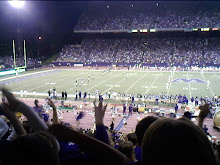An informal poll of the Pac-10 coaches done by Ted Miller of ESPN has them voting six to four in favor of ending the current round robin scheduling in the Pac-10. Currently every team plays the other once during the season, which is an important feather in the Pac-10 cap.
The advantages of dumping the schedule are immense, in that it allows for an easier route to get six wins (something the Huskies desperately need) and an easier time getting into BCS bowl games.
The problems would be that there would be a large dearth in visits from and visits to, say, the California schools for the Huskies.
Remember the Huskies didn't play UCLA in 1991 and 1992, and didn't play USC in 1999 and 2000. They also didn't play UCLA at home for four years between 1990 and 1994.
The only stipulation of the new schedules is that each team must play its natural rival every year.
UCLA v. USC, Cal v. Stanford, and Washington v. WSU all will stay. It's rivalries like Washington v. Oregon that could become tricky to schedule.
Ask any Oregon fan, and they will tell you they want to play the Huskies every year, and vice versa. Not saying it can't be done; it would just be more difficult.
In the same vein, the southern California schools would want to make sure they had the Bay Area schools too.
The Arizona schools, of course, being somewhat loners.
In terms of Husky news, this may prove fruitful. While taking away a home conference game every year, they can add a fourth non-conference foe. Ideally that would be someone like another Idaho or other mid-major.
Knowing the schedulers at Washington, however, it would be Florida or someone.
The round robin schedule is a huge deal for a lot of proponents of the conference. It provides them with a moral high ground when they argue (I've used it myself on many occasions).
It would be interesting to see how the perception of the league would rise or fall based on losing the round robin—especially in the eyes of the voters.
Suffice it to say, it's still going to be a contentious issue when the next Pac-10 meetings roll around.



No comments:
Post a Comment